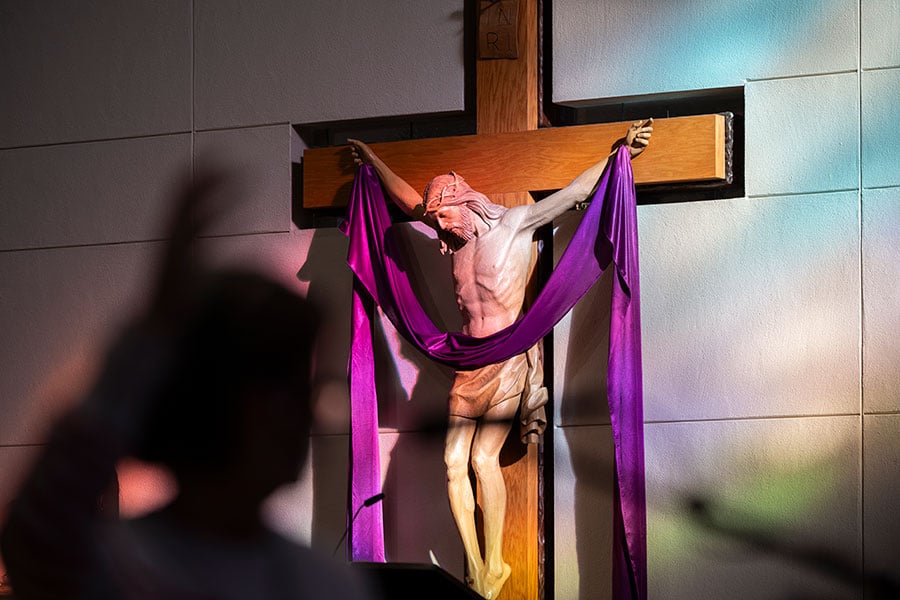To delight in Lent

A crucifix is seen behind the altar during the Ash Wednesday Mass on February 14, 2024. Students of St. Joseph Catholic School participated in the liturgy. (NTC/Juan Guajardo)
"Unless you turn and become like children, you will never enter the kingdom of Heaven.” We understand the season of Lent to be about repentance, change, and growth in holiness, but what does this look like? What does it mean in our own lives?
According to our Lord, the answer has a lot to do with becoming like children. This kind of conversion is so important to Jesus that He says without it, heaven is unattainable. What does it mean to become like a child?
G.K. Chesterton, in “Orthodoxy,” writes that children rejoice in monotony. They love to see things happen again and again. They have an overabundance of life that rejoices in the ordinary around them. He says perhaps this same vital, excited energy flows through God’s divine life as He makes the sun rise and fall day after day, without fail. “It is possible that God says every morning, ‘Do it again’ to the sun; and every evening, ‘Do it again’ to the moon.”
C.S. Lewis also picks up on this theme of childlike joy. He says that on earth things are often upside down from how they are in heaven. On earth, work, anxiety, and stress consume most of our time and attention, where joy is at best a sidelined occasional experience. Not so in heaven. Anxiety is gone. Suffering has ended. Playful noise fills the streets. “Joy is the serious business of heaven,” he writes in “Letters to Malcolm: Chiefly on Prayer.”
In the spirit of joyful repetition, Peter Kreeft, in “The Sea Within,” describes the ocean and its almost “divine-like” grandeur, writing if each wave could talk on behalf of God, they would repeat with each crash on the beach the simple but profound declaration of God to mankind: “I love you, I love you, I love you, I love you.”
To be childlike requires a different lens through which we engage the ordinary and monotonous. It requires joyful hope, humor, a deep sense that the love of God pumping through our veins and reflected in the oceans weighs heavier than the passing sufferings of this life. It requires a deep conviction that even the most failed and sinful life can be redeemed. This is only possible if the fundamental disposition of one’s life is dependence. Dependence on a good God and on His powerful providence.
Often, we engage Lent through a different lens — the lens of a need for self-perfection, a sense of needing to “get better,” to overcome vice and become perfect. To be clear, virtue and overcoming sin are necessary for repentance. But what drives this process? Is it my own need to be perfect and faultless? Or am I drawn to this by a deep conviction that God actually delights in me, and that my conversion is less of me working hard and more of me letting God?
No, the goal of Lent is not primarily about “getting better,” but to grow more deeply in love with Jesus Christ and to become ever more aware of His love for you.
This Lent, let us foster repentant hearts, desirous of conversion, not simply because of hurt pride at having sinned, but because of a deep love for Jesus Christ against whom we have sinned. For when we recognize God’s goodness, His childlike joy, His intimate and particular concern for our lives, and most especially His desire to forgive and restore us, then Lent and repentance change tone in our hearts.
This Lent is not merely about “getting better.” It is about drawing more deeply into the Lord who delights in me. As Proverbs tells us, “Before the mountains had been shaped … I was beside Him, like a master workman; and I was daily His delight, rejoicing before Him always, rejoicing in His inhabited word, and delighting in the sons of men.”

Father Brett Metzler serves as Chaplain at Nolan Catholic High School in Fort Worth and as the Vocations Director for the diocese.
